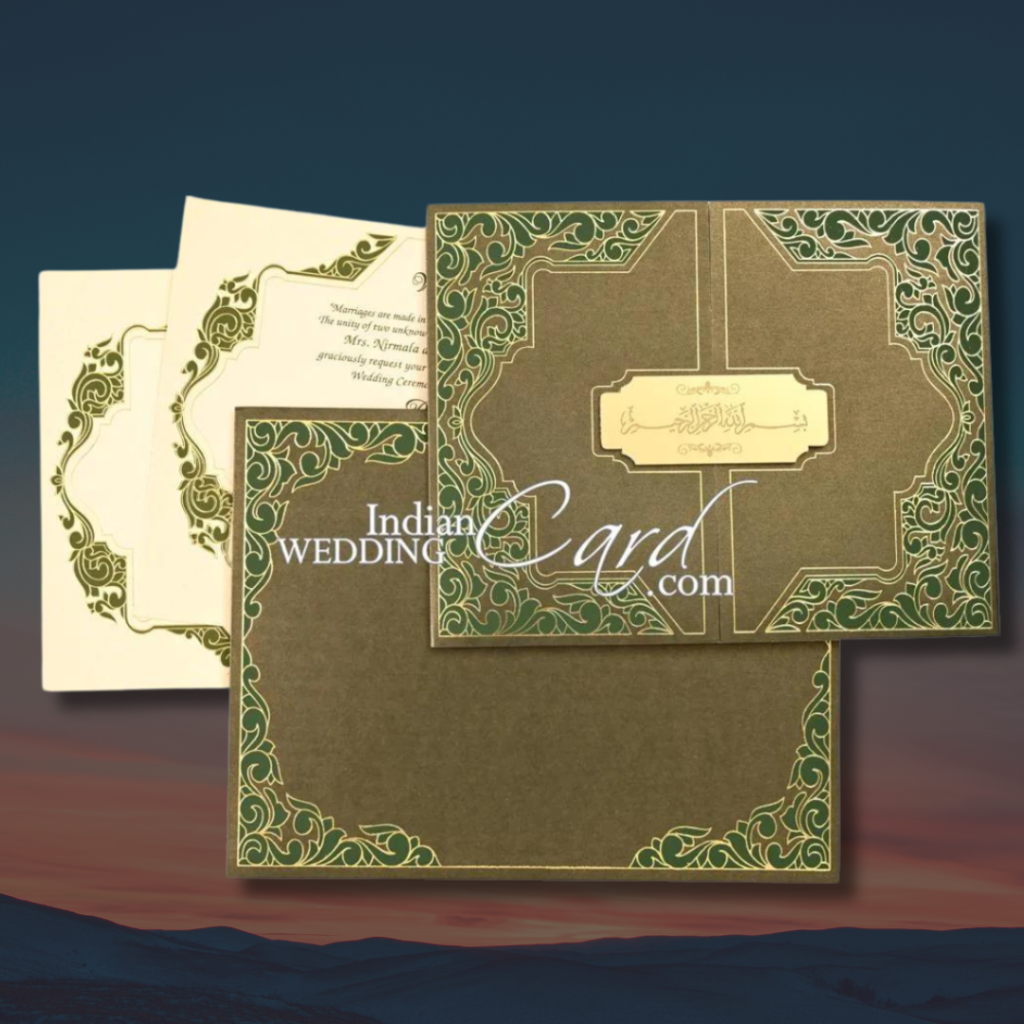Elegance in Script: Classic & Contemporary Muslim Wedding Cards
A Muslim wedding is one of life’s most important events, and the invitation sets the tone for the celebration as a whole. It’s more than just a document; it’s a representation of the couple’s aesthetic, cultural background, and the happy marriage they are about to begin. Classic tradition and modern elegance coexist in a stunning way in the world of Muslim wedding invites. Let’s see how Muslim wedding cards capture this classic charm while incorporating contemporary ideas.

Respecting Customs with Calligraphy
The skill of calligraphy is the foundation of traditional Muslim wedding invitations. In Islamic culture, calligraphy is highly esteemed and represents spirituality, beauty, and a supernatural connection. Traditionally, Muslim wedding cards have been decorated with beautiful Arabic calligraphy, often with Quranic verses or sentiments wishing the couple blessings. The ink’s richness and the script’s fluidity arouse awe while honoring the centuries-old Islamic artistic traditions.
Accepting Modern Design Features
Muslim wedding cards are based in tradition, but they also effortlessly combine traditional aspects with current design sensibility. These days, engaged couples look for invites that capture both their individual wedding celebration theme and sense of style. Modern Muslim wedding cards provide a wide range of possibilities to suit every taste, from bold, geometric patterns and vivid color palettes to minimalist designs with clear lines. These invites are elevated to the status of works of art by the use of cutting-edge printing processes like foil stamping and laser cutting, which give them a touch of elegance and luxury.
Symbolism and Significance
A Muslim wedding card has deep symbolic meaning attached to each component. There is cultural significance associated with the selection of colors, patterns, and even the materials used to make the invitation. For instance, the color green, which is frequently connected to Islam, represents blessings from Allah as well as growth and prosperity. A sense of heavenly amazement and spiritual guidance is evoked by the crescent moon and stars, while floral themes like the rose and jasmine stand for love, purity, and beauty. Couples appreciate their cultural history and give their wedding celebrations a greater significance by including these meaningful elements into their invitations.

Personalization and Customization
Customization is essential in the current digital era, and Muslim wedding invites are no exception. Every element of a couple’s wedding card can be customized, including the text, design, typeface, and color scheme. Bespoke design options are widely available from printing firms, enabling couples to create genuinely distinctive invitations that capture their personality and love tale. Personalization of the invitation—a beloved saying, a family crest, or a picture of the couple, for example—adds a poignant touch that makes the invitation stand out to the receivers.

The Invitation as a Keepsake
A Muslim wedding invitation serves as more than just an announcement; it’s typically treasured as a memento, a physical link to the happy occasion. Knowing that their invites will be cherished by family and friends for years to come, couples take great pleasure in choosing the ideal design. In order to ensure that their wedding cards last a lifetime as treasured keepsakes of their special day, many couples choose premium materials and finishes that improve the longevity and beauty of their cards.
Conclusion
When it comes to Muslim wedding invites, script elegance embraces the modern preferences of today’s newlyweds while also embodying the classic beauty of tradition. Wedding cards skillfully bridge the gap between the past and present, from the elegant curves of Arabic calligraphy to the sleek lines of contemporary design, producing invitations that are both beautiful and meaningful. The wedding invitations that couples receive as they begin their path towards marriage are a symbol of the eternal power of love, religion, and cultural tradition.